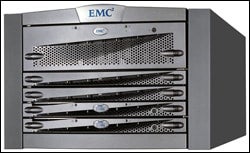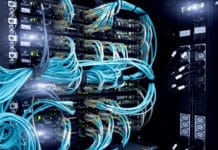DMX-4 may get top billing, but EMC isn’t ignoring its other platforms this summer, refreshing the Centera, Celerra, Rainfinity and Clariion lines.
In keeping with the energy-efficiency theme, EMC has redesigned its Centera online archive system to consume less power.
EMC designed the new Centera Generation 4 LP (low power) node with low-power processors and chipsets, adaptive cooling and more efficient power supplies, said Barbara Robidoux, EMC vice president of storage marketing.
While the machine has been changed somewhat to use less energy, it also boasts 50 percent more storage capacity per node thanks to — of course — the new 750GB SATAdisk drives, which will come later this year.
Moreover, new security features in the EMC CentraStar storage operating system provide greater levels of authentication, system logging and auditing.
But users needn’t buy a Centera Generation 4 box to enjoy the new CentraStar software, because it is compatible with previous Centera generations and is available as a free upgrade to customers with contracts. The new Generation 4 LP nodes can also be used in customers’ existing Centera systems.
Available now, pricing for a basic 4 node (each node includes a Centera server and three disks) Gen 4 is $73,670, and a basic 4 Node Gen4 LP will cost $77,300.
The new EMC Celerra NS20 and NS40 storage systems run in network attached storage (NAS) and storage area network (SAN) environments using iSCSI or Fibre Channel connectivity. Supporting multiple protocols will enable EMC to keep pace with rival Network Appliance.
 |
| Celerra NS20 Source: EMC |
The systems, which like the DMX-4 machines will run new 750GB SATA II drives to pare power consumption, fire up in 15 minutes with the new Celerra Startup Assistant software.
The new Celerras will be sold next month; the NS20 system begins at $34,000, while the multi-protocol Celerra NS40 system starts at $50,000. Fibre Channel connectivity is a separate option for both systems.
EMC isn’t letting its Rainfinity NAS file virtualization assets get stale, either, unveiling the Rainfinity File Management Appliance (FMA).
Robidoux said that while the traditional enterprise-grade box includes six applications, the new, entry-level EMC Rainfinity appliance machine explicitly automates policy management to archive inactive data.
With FMA, customers can automatically move and retrieve files from EMC Celerra, EMC Centera archiving servers and even NetApp NAS systems. Running out of file room? Customers can upgrade from the FMA to the full Rainfinity Global File Virtualization system. Available now, the Rainfinity FMS costs $42,500.
Finally, the Clariion CX3’s Flare 26 operating system features new access control, compliance and audit features. Also, the CX3 now supports native iSCSI remote replication, IBM’s AIX and HP-UX iSCSI attached hosts. The Clariion boxes will also support the 750GB SATA II disk drives.
EMC Flare 26 will be available in August as a free upgrade for existing Clariion CX3, CX300, CX500, CX700 customers. The new security, compliance and availability features will be included; remote replication via iSCSI on the CX3 series will be included with the purchase of MirrorView/S, MirrorView/A, and SAN Copy.
Article courtesy of InternetNews.com





